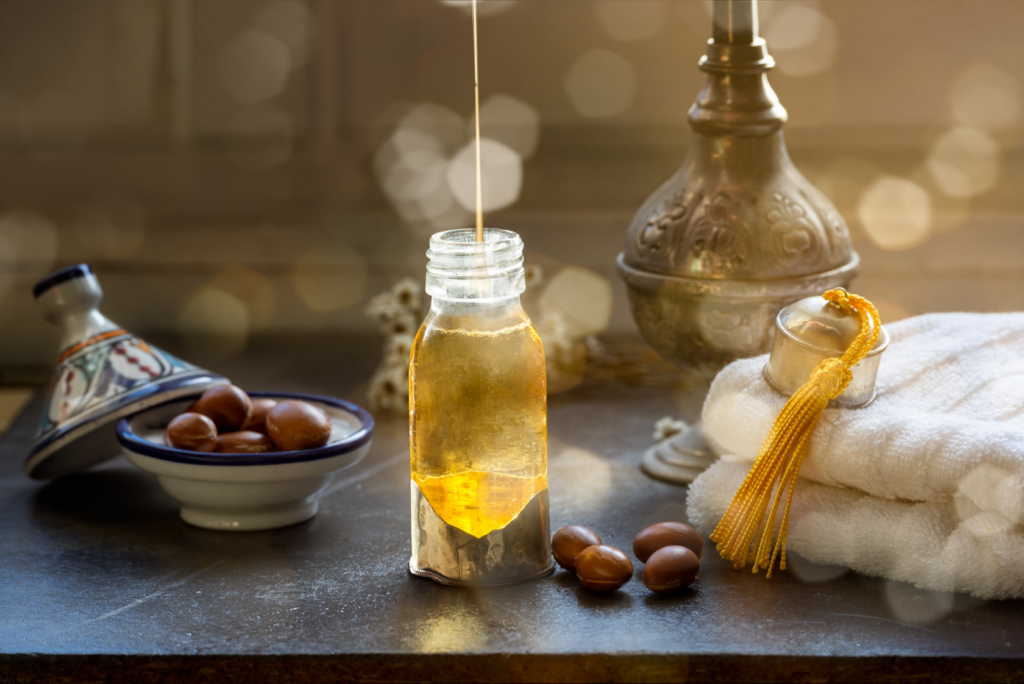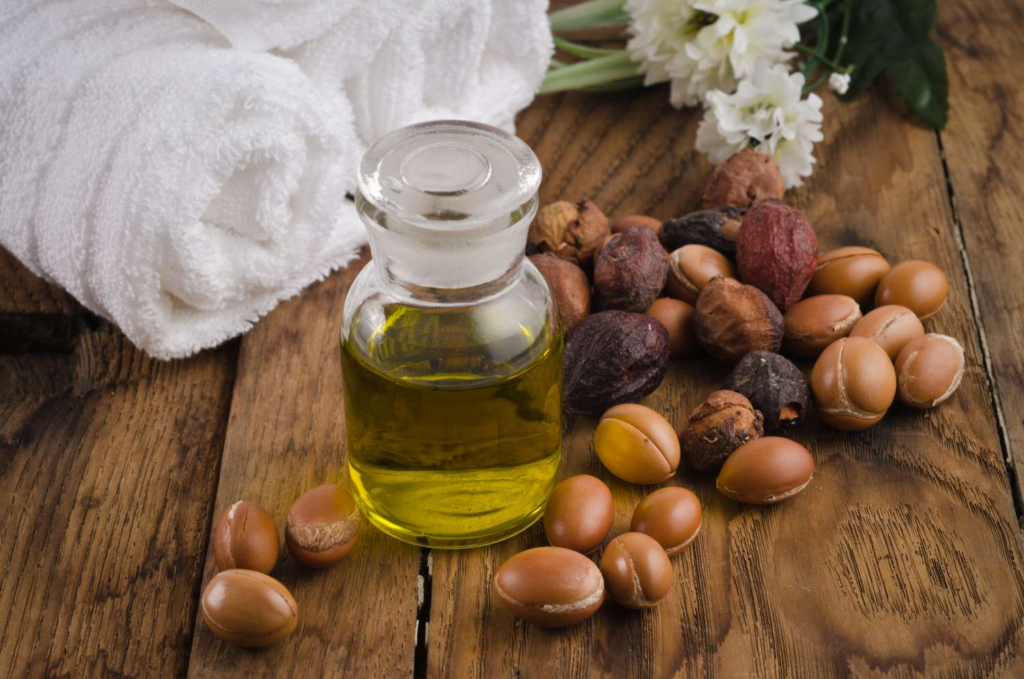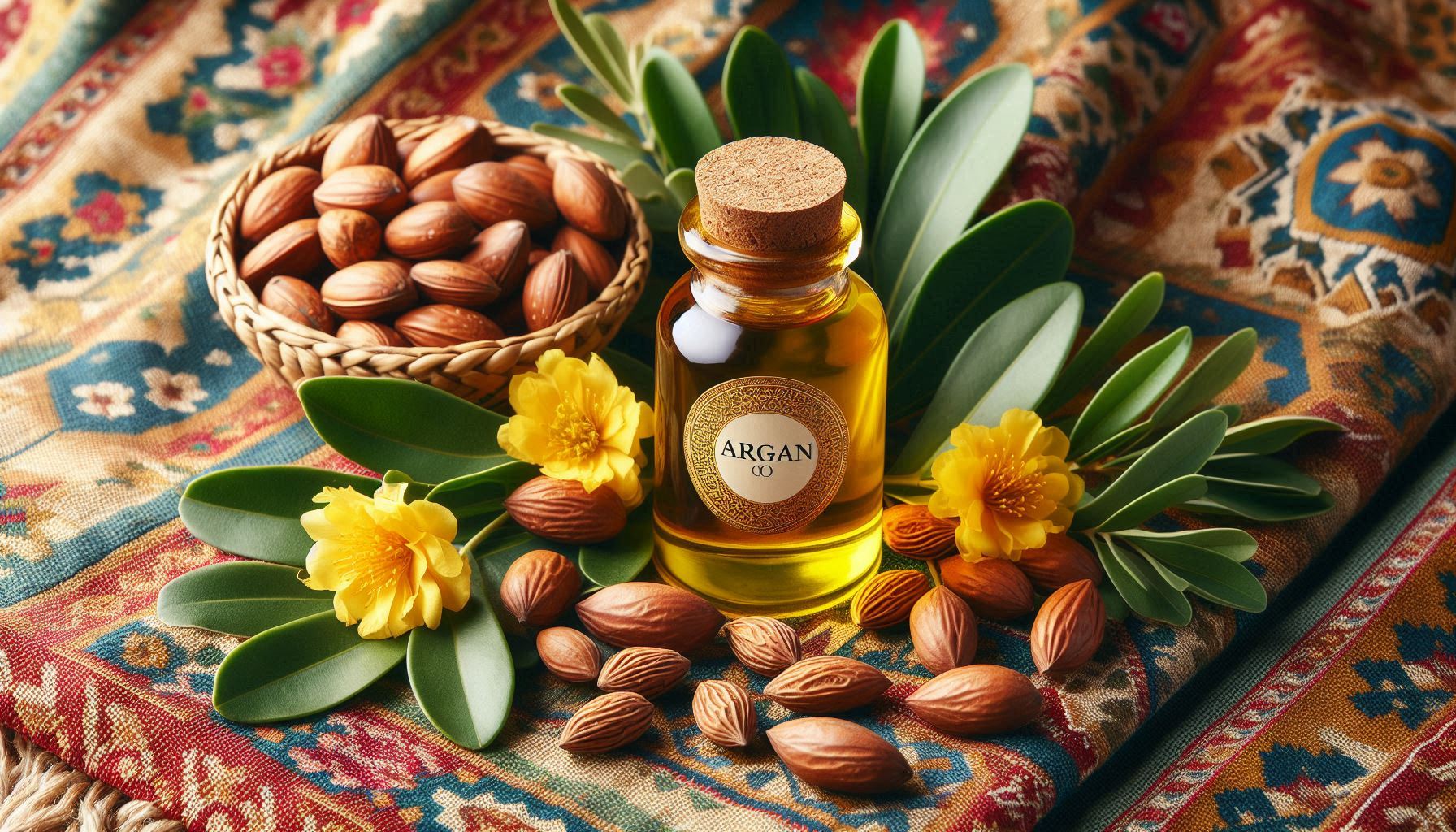Introduction
Argan oil, often referred to as “liquid gold,” has gained a well-deserved reputation in the beauty industry for its versatility and effectiveness. Whether you’re looking to hydrate your skin, strengthen your hair, or condition your nails, argan oil can do it all. But what makes this oil so special? Let’s dive into the origins, benefits, and best uses of argan oil to understand why it should be a staple in your beauty routine.
What is Argan Oil?
Argan oil is a plant oil produced from the kernels of the argan tree (Argania spinosa L.), which is native to Morocco. The oil is traditionally used for culinary purposes, but it has also been widely used in skincare, haircare, and nail care due to its rich nutrient profile.
The Origins of Argan Oil
Where Does Argan Oil Come From?
Argan oil is exclusively produced in Morocco, where the argan tree grows in the semi-desert region of Souss. The process of extracting argan oil is labor-intensive, involving the manual collection, drying, and pressing of argan nuts.
Traditional Methods of Extraction
Traditionally, argan oil is extracted by hand, a process that involves cracking the nuts between two stones, removing the kernels, and grinding them into a paste. This paste is then pressed to extract the oil, a method that has been passed down through generations.
The Nutritional Profile of Argan Oil
Rich in Essential Fatty Acids
Argan oil is packed with essential fatty acids, including oleic acid and linoleic acid, which help to maintain the skin’s moisture barrier and promote healthy hair growth.
High in Vitamin E
Vitamin E is a powerful antioxidant that protects the skin from free radical damage. Argan oil is one of the richest natural sources of Vitamin E, making it an excellent choice for anti-aging and skin protection.
Packed with Antioxidants
In addition to Vitamin E, argan oil contains other antioxidants such as polyphenols and sterols, which help to soothe the skin, reduce inflammation, and promote healing.

Benefits of Argan Oil for Skin
Moisturizes and Hydrates
Argan oil is an excellent moisturizer due to its high content of fatty acids. It penetrates deeply into the skin, providing long-lasting hydration without clogging pores.
Reduces Signs of Aging
The antioxidants in argan oil help to fight free radicals, which can cause premature aging. Regular use of argan oil can reduce the appearance of fine lines, wrinkles, and age spots.
Heals and Repairs Skin
Argan oil is known for its healing properties, making it effective in treating conditions like eczema, psoriasis, and acne. Its anti-inflammatory properties help to soothe irritated skin and promote faster healing.
Controls Oil Production
Argan oil has a unique ability to balance the skin’s oil production, making it beneficial for both dry and oily skin types. It can help regulate sebum production, reducing the likelihood of breakouts.
Benefits of Argan Oil for Hair
Strengthens and Nourishes Hair
Rich in nutrients, argan oil strengthens hair strands, reducing breakage and promoting overall hair health. It’s especially beneficial for those with brittle or damaged hair.
Tames Frizz and Adds Shine
Argan oil is often used as a hair serum to tame frizz, add shine, and protect hair from heat damage. It smooths the hair cuticle, giving hair a glossy finish.
Promotes Hair Growth
Regular application of argan oil can stimulate hair growth by nourishing the scalp and strengthening the hair follicles. It’s an excellent treatment for thinning hair or hair loss.
Treats Dry Scalp and Dandruff
The moisturizing properties of argan oil extend to the scalp, helping to treat dryness and reduce dandruff. It can soothe an itchy scalp and restore moisture balance.

Benefits of Argan Oil for Nails
Strengthens Nails
Argan oil can be used to strengthen brittle nails, making them less prone to breaking or splitting. Its rich nutrient profile helps to nourish and protect nails.
Conditions Cuticles
Regular use of argan oil can soften and condition cuticles, making them easier to manage and reducing the risk of hangnails.
Prevents Nail Breakage
By strengthening the nails and hydrating the cuticles, argan oil helps to prevent nail breakage and promotes healthier nail growth.
How to Use Argan Oil in Your Daily Routine
Applying Argan Oil to Skin
- Face: After cleansing, apply a few drops of argan oil to your face and neck. Gently massage it into the skin using circular motions.
- Body: Use argan oil as a body moisturizer by applying it to damp skin after showering. It can also be added to your bath for an all-over body treatment.
Using Argan Oil on Hair
- Pre-Shampoo Treatment: Apply argan oil to your hair and scalp before shampooing to nourish and protect your hair.
- Leave-In Conditioner: Use a small amount of argan oil as a leave-in conditioner to smooth frizz and add shine.
Argan Oil for Nail Care
- Nail Treatment: Massage a few drops of argan oil into your nails and cuticles to strengthen and condition them.
- Overnight Treatment: Apply argan oil to your nails before bed and wear cotton gloves to allow the oil to penetrate deeply.
Argan Oil vs. Other Oils
Argan Oil vs. Coconut Oil
While both oils are excellent for skin and hair, argan oil is lighter and less likely to clog pores, making it better suited for acne-prone skin.
Argan Oil vs. Jojoba Oil
Jojoba oil is similar to the skin’s natural sebum, making it an excellent moisturizer. However, argan oil is richer in nutrients, making it more effective for anti-aging and healing.
Argan Oil vs. Olive Oil
Olive oil is heavier and more comedogenic than argan oil, making it less suitable for those with oily or acne-prone skin.

Choosing the Best Argan Oil
What to Look for in Argan Oil Products
- Purity: Choose 100% pure, cold-pressed argan oil for the best results.
- Packaging: Look for argan oil in dark glass bottles to protect it from light exposure.
- Certification: Opt for products that are certified organic to ensure they are free from pesticides and chemicals.
Organic vs. Non-Organic Argan Oil
Organic argan oil is produced without the use of synthetic pesticides or fertilizers, making it a better choice for those concerned about environmental impact.
Tips for Storing Argan Oil
Store argan oil in a cool, dark place to prevent it from oxidizing. It’s best to use it within six months of opening.
Top 5 Argan Oil Products
- Product 1: [Detailed review of the product, its benefits, and how to use it.]
- Product 2: [Detailed review of the product, its benefits, and how to use it.]
- Product 3: [Detailed review of the product, its benefits, and how to use it.]
- Product 4: [Detailed review of the product, its benefits, and how to use it.]
- Product 5: [Detailed review of the product, its benefits, and how to use it.]
FAQs About Argan Oil
Can Argan Oil Be Used on All Skin Types?
Yes, argan oil is non-comedogenic, making it suitable for all skin types, including sensitive and acne-prone skin.
How Often Should I Use Argan Oil on My Hair?
You can use argan oil on your hair daily or as needed, depending on your hair type and the desired results.
Is Argan Oil Safe for Sensitive Skin?
Argan oil is generally safe for sensitive skin, but it’s always best to do a patch test before applying it to your face.
Conclusion
Argan oil is truly a versatile beauty product with numerous benefits for your skin, hair, and nails. Its rich nutrient profile and gentle nature make it suitable for all skin types, and its ability to hydrate, heal, and protect makes it a must-have in your beauty arsenal. Whether you’re looking to nourish your skin, tame your hair, or strengthen your nails, argan oil is the perfect solution.
5 Unique FAQs After the Conclusion
- Can I Mix Argan Oil with Other Essential Oils?
- Yes, argan oil can be mixed with other essential oils to enhance its benefits. Just ensure the other oils are suitable for your skin type.
- Is Argan Oil Effective for Treating Stretch Marks?
- Argan oil’s moisturizing and healing properties make it effective in reducing the appearance of stretch marks.
- Can Argan Oil Be Used During Pregnancy?
- Yes, argan oil is safe to use during pregnancy and can help prevent and treat stretch marks.
- Does Argan Oil Have an Expiry Date?
- Argan oil typically has a shelf life of 12-18 months if stored properly. However, it’s best to use it within six months of opening.
- Can I Use Argan Oil on My Lips?
- Yes, argan oil can be used to moisturize and protect your lips. It’s especially effective for treating chapped lips.
Read More:
Best Vitamin C Serum – Your Ultimate Guide to Radiant Skin
The Ultimate Guide to Make1M.com: Unlocking Your Path to Financial Freedom
Understanding aiotechnical.com Health
The Comprehensive Guide to Web Browsers: Understanding, Choosing, and Using Them
